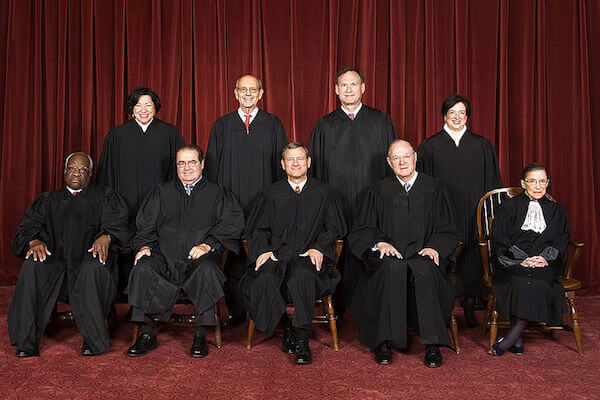Under the US Constitution’s Full Faith and Credit Clause, a state court is supposed to recognize the judgments of courts from other states unless those courts did not have jurisdiction over the parties or the subject matter of the case.
Asked to rule on whether an Alabama court must recognize a Georgia adoption decree involving a same-sex couple, however, the Alabama Supreme Court manufactured a jurisdictional issue in order to reverse a ruling by Alabama’s Court of Civil Appeals and deny recognition to the Georgia adoption.
As a result, the child’s adoptive mother, identified in court papers as V.L., will be denied visitation with the children she had been raising with her former partner.
In end run around federal full faith and credit constitutional obligation, eight of nine justices create “jurisdictional” quibble
The Alabama court issued its September 18 decision in E.L. v. V.L. “per curiam,” which means that none of the justices took credit for this opinion.
Justice Greg Shaw was the sole dissenter, arguing that there was no jurisdictional issue in the case and that the court was required to recognize the adoption.
The women, involved in a relationship for six years during which they resided in Alabama, decided to have children through donor insemination. E.L. gave birth to one child in 2002 and twins in 2004. Following their birth, V.L. acted as a parent to the children along with E.L. The women decided jointly to have V.L. adopt the children as a co-parent, but that was impossible in Alabama at that time. They learned through friends in Georgia, however, that the Fulton County Superior Court in Atlanta had granted second-parent adoption petitions, and the only thing that stood in their way was a six-month residency requirement. They rented a place in Georgia to establish residency, proceeded through the formal adoption procedures, and obtained an adoption decree on May 30, 2007, after which they resumed full-time residency in Alabama.
Subsequently they obtained new birth certificates for the children listing V.L. as a parent, presumably by showing the adoption decree to the appropriate Alabama clerk to obtain the new birth certificates.
The women ended their relationship in November 2011, and V.L. moved out. E.L. eventually denied her further access to the children, so V.L. brought the Georgia adoption decree to the Jefferson Circuit Court in Birmingham, asking to have it registered and seeking a declaration of her legal parental rights, including “some measure of custody of or visitation with the children.” Her case was transferred to the County Family Court, which awarded V.L. visitation rights.
E.L. then appealed to the Alabama Court of Civil Appeals, which rejected most of her arguments but agreed that the family court should have granted E.L. a hearing on the “best interest of the children.” E.L., however, was not satisfied with that, since the appellate ruling implicitly rejected her argument that the Georgia adoption was invalid. She appealed that part of the decision to the Alabama Supreme Court, which ruled last week.
In its ruling, the high court reversed the lower appeals court, concluding that Alabama was not required to give full faith and credit to the Georgia adoption decree. To reach that conclusion, the Alabama court had to find that the Fulton Family Court lacked jurisdiction either over this family or over the subject matter of the adoption proceeding.
E.L. contended the women had not really established residence in Georgia, since they never moved into the residence they rented there. They worked in Alabama and spent just a few days in the Georgia place for appearance sake when the child welfare officials came to interview the family regarding the adoption.
E.L. also argued that Georgia’s adoption statute did not allow for the second-parent adoptions taking place in Atlanta, so the Alabama court did not have the power to approve such an adoption. Under Georgia law, she asserted, a third party can only adopt a child if the parents have first “surrendered or had terminated” their rights.
The Alabama Supreme Court embraced this second, subject-matter objection to the Georgia court’s jurisdiction.
E.L.’s assertion that Georgia law does not provide for the second-parent adoption V.L. secured is a matter that state’s Supreme Court has never addressed, but the Alabama Supreme Court premised its conclusion on a dissenting opinion of a single judge on the Georgia court when that bench denied review in a second-parent case. Somehow, the Alabama court concluded that the Georgia dissenter provided “the proper analysis” of that state’s adoption statute, and so could be relied on in rejecting the adoption on jurisdictional grounds.
Under the Full Faith and Credit Clause, the Alabama court may not inquire into the “merits” of Georgia court’s decision, but it has the authority to refuse to recognize it on jurisdictional grounds.
The Alabama court concluded that the court “erred by entering the Georgia judgment by which V.L. became an adoptive parent of the children” and found that this error was jurisdictional, not just a misinterpretation of Georgia law. “The Georgia court was not empowered to enter the Georgia judgment,” the Alabama court concluded, and thus “lacked subject-matter jurisdiction” over the matter.
Justice Shaw’s dissent is clear and to the point. The provision in the Georgia adoption statute that the Alabama Supreme Court invoked “speaks to the merits of whether the adoption should be granted — not to whether the trial court obtains subject-matter jurisdiction,” he wrote, noting that Georgia statutes give the Georgia Superior Court jurisdiction “in all matters of adoption.” Shaw added, “This would include adoption matters where the petitioners fail to ‘satisfy’ the court that the requisites for an adoption were met.”
While Shaw would “tend to agree” that on the merits the Georgia Superior Court erred by construing Georgia’s adoption statute to allow V.L.’s adoption of her child, that was irrelevant to a full faith and credit constitutional analysis. “Our case law prohibits an inquiry into the merits of a foreign judgment,” he insisted. “Further, I fear that this case creates a dangerous precedent that calls into question the finality of adoptions in Alabama.”
The National Center for Lesbian Rights represents V.L. together with Alabama lawyers Heather Fann and Traci Vella. Although they criticized the Alabama Supreme Court’s ruling, it was unclear whether these attorneys will seek US Supreme Court review. The nation’s high court has turned down prior requests to review lower court rulings on gay adoption issues, most prominently a US Fifth Circuit Court of Appeals decision refusing to order Louisiana to recognize the New York adoption of a Louisiana-born child by a New York couple who were seeking an appropriate birth certificate. The Fifth Circuit concluded that federal district courts do not have authority to order state government officials to recognize out-of-state adoptions. Such case, it held, must be brought in state courts.
Facing the outspokenly anti-gay Alabama Supreme Court, V.L. found that the state court route can in some cases be fruitless.


























